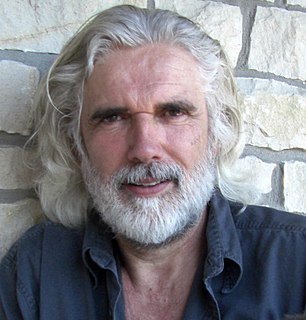
Anthropology is the scientific study of humanity, concerned with human behavior, human biology, cultures, societies, and linguistics, in both the present and past, including past human species. Social anthropology studies patterns of behaviour, while cultural anthropology studies cultural meaning, including norms and values. A portmanteau sociocultural anthropology is commonly used today. Linguistic anthropology studies how language influences social life. Biological or physical anthropology studies the biological development of humans.
Milford Howell Wolpoff is a paleoanthropologist and professor of anthropology at the University of Michigan and its museum of Anthropology. He is the leading proponent of the multiregional evolution hypothesis that explains the evolution of Homo sapiens as a consequence of evolutionary processes and gene flow across continents within a single species. Wolpoff authored the widely-used textbook Paleoanthropology, and co-authored Race and Human Evolution: A Fatal Attraction, which reviews the scientific evidence and conflicting theories about the interpretation of human evolution, and biological anthropology's relationship to views about race.
In anthropology, folkloristics, and the social and behavioral sciences, emic and etic refer to two kinds of field research done and viewpoints obtained: emic, from within the social group and etic, from outside.

In the slave societies of the Americas, a quadroon or quarteron was a person with one quarter African and three quarters European ancestry.

Montague Francis Ashley-Montagu — born Israel Ehrenberg — was a British-American anthropologist who popularized the study of topics such as race and gender and their relation to politics and development. He was the rapporteur, in 1950, for the UNESCO statement "The Race Question".

Julian Haynes Steward was an American anthropologist best known for his role in developing "the concept and method" of cultural ecology, as well as a scientific theory of culture change.

A folk taxonomy is a vernacular naming system, as distinct from scientific taxonomy. Folk biological classification is the way people traditionally describe and organize their natural surroundings/the world around them, typically making generous use of form taxa like "shrubs", "bugs", "ducks", "fish" and the like, or of economic criteria such as "game animal" or "pack animal".
Ecological anthropology is a sub-field of anthropology and is defined as the "study of cultural adaptations to environments". The sub-field is also defined as, "the study of relationships between a population of humans and their biophysical environment". The focus of its research concerns "how cultural beliefs and practices helped human populations adapt to their environments, and how people used elements of their culture to maintain their ecosystems". Ecological anthropology developed from the approach of cultural ecology, and it provided a conceptual framework more suitable for scientific inquiry than the cultural ecology approach. Research pursued under this approach aims to study a wide range of human responses to environmental problems.
Clyde Kluckhohn, was an American anthropologist and social theorist, best known for his long-term ethnographic work among the Navajo and his contributions to the development of theory of culture within American anthropology.
In anthropology, a pantribal sodality is a social grouping which is not determined by family membership (non-kin), and which extends across an entire tribe. Pantribal sodalities sometimes arise in areas where two or more different cultures overlap and are in regular contact. Such sodalities are especially likely to develop in the presence of warfare between tribes. Drawing their membership from different villages of the same tribe, such groups could mobilize men in many local groups for attack or retaliation against another tribe.
A ranked society in anthropology is one that ranks individuals in terms of their genealogical distance from the chief. Another term for a "ranked society" is a chiefdom. Closer relatives of the chief have higher rank or social status than more distant ones. Societies which follow this kind of structure associate rank with power, where other societies associate wealth with power. When individuals and groups rank about equally, competition for positions of leadership may occur. In some cases rank is assigned to entire villages rather than individuals or families. The idea of a ranked society was criticized by Max Weber and Karl Marx. Ranks in ranked society are the different levels, platforms, or social classes that determine someone’s influence on political aspects, votes, decision making, etc. A person’s ranking also gives them societal power.

Roy A. Rappaport (1926–1997) was an American anthropologist known for his contributions to the anthropological study of ritual and to ecological anthropology.

A sociocultural system is a "human population viewed (1) in its ecological context and (2) as one of the many subsystems of a larger ecological system".
A cultural invention is any innovation developed by people. Cultural inventions include sets of behaviour adopted by groups of people. They are perpetuated by being passed on to others within the group or outside it. They are also passed on to future groups and generations. Sources of cultural invention can either come from outside a specific group or from within that group.

Harald E. L. Prins is a Dutch anthropologist, ethnohistorian, filmmaker, and human rights activist specialized in North and South America's indigenous peoples and cultures.
The Etoro, or Edolo, are a tribe and ethnic group of Papua New Guinea. Their territory comprises the southern slopes of Mt. Sisa, along the southern edge of the central mountain range of New Guinea, near the Papuan Plateau. They are well known among anthropologists because of ritual acts practiced between the young boys and men of the tribe. The Etoro believe that young males must ingest the semen of their elders to achieve adult male status and to properly mature and grow strong.
Richard Robbins is a Distinguished Teaching Professor of anthropology at the State University of New York at Plattsburgh.
Erika Eichhorn Bourguignon was an Austrian-born American anthropologist known primarily for her work on possession trance and other altered states of consciousness. She was “considered the premier anthropological authority on trance, possession, and altered states of consciousness” and "one of the founders of the field of anthropology of consciousness." She was born in Vienna, Austria, but left with her parents in 1938. After receiving a B.A. from Queens College in 1945, she began graduate studies at Northwestern University, working there under Melville J. Herskovits and Alfred Irving Hallowell. She did field research among the Chippewa in Wisconsin and in Haiti (1947–48).
Serena Nanda is an American author, anthropologist, and professor emeritus. She received the Ruth Benedict Prize in 1990 for her monograph, Neither Man nor Woman: The Hijras of India.
Ruth O. Selig is an American anthropologist, educator, and museum administrator known for her pioneering work advancing the incorporation of anthropology in precollege education, through teacher training programs, publications designed for high school and undergraduate instructors and students, and the Smithsonian Institution’s Department of Anthropology’s enhanced role in public outreach and education.







